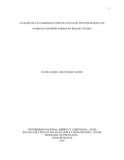Please use this identifier to cite or link to this item:
https://repository.unad.edu.co/handle/10596/27026Full metadata record
| DC Field | Value | Language |
|---|---|---|
| dc.contributor.advisor | Castellanos Garcia, Gloria Esperanza | - |
| dc.coverage.spatial | cead_-_ibagué | spa |
| dc.creator | Aranzalez Legro, Eloisa Maria | - |
| dc.date.accessioned | 2019-07-19T20:51:37Z | - |
| dc.date.available | 2019-07-19T20:51:37Z | - |
| dc.date.created | 22018-09-10 | - |
| dc.identifier.uri | https://repository.unad.edu.co/handle/10596/27026 | - |
| dc.description.abstract | Esta investigación tuvo como objetivo analizar las barreras comunicativas de tipo psicológico en la comunicación de familias con hijos Sordos en la cuidad de Ibagué, partiendo de una argumentación teórica y reflexiva de las experiencias de vida de los participantes. Se contó con un grupo de 5 familias que tienen un hijo Sordo, seleccionados a partir de muestreo intencional, bajo un enfoque cualitativo. Como técnicas e instrumentos para la recolección de información, se hizo uso de una entrevista abierta semi-estructurada y la ficha de caracterización que permitió obtener información desde las experiencias y vivencias de la población objeto, identificando por medio de estas, falencias en la comunicación de las personas Sordas con su entorno familiar, esto, debido al desconocimientos que se tiene sobre la Lengua de Señas por parte de los oyentes, impidiendo de esta manera, integrar al Sordo en diferentes contextos. | spa |
| dc.format | spa | |
| dc.format.mimetype | application/pdf | spa |
| dc.language.iso | spa | spa |
| dc.publisher | Universidad Nacional Abierta y a Distancia UNAD | spa |
| dc.title | Análisis de las barreras comunicativas de tipo psicológico en familias con hijos sordos en ibague, tolima. | spa |
| dc.type | Proyecto de investigación | spa |
| dc.subject.keywords | Familia, Barreras comunicativas, comunicación familiar, discapacidad auditiva. | spa |
| dc.description.abstractenglish | The objective of this research was to analyze the communicative barriers of psychological type in the communication of families with Deaf children in the city of Ibagué, starting from a theoretical and reflective argumentation of the life experiences of the participants. We counted on a group of 5 families that have a Deaf child, selected from intentional sampling, under a qualitative approach. As techniques and instruments for the collection of information, a semi-structured open interview was used and the characterization file that allowed obtaining information from the experiences and experiences of the target population, identifying by means of these, shortcomings in the communication of Deaf people with their family environment, this, due to the ignorance of the Sign Language on the part of the listeners, preventing in this way, integrating the Deaf in different contexts. | spa |
| dc.rights.accesRights | info:eu-repo/semantics/openAccess | spa |
| dc.rights.acceso | Abierto (Texto Completo) | spa |
| Appears in Collections: | Psicología | |
Files in This Item:
| File | Description | Size | Format | |
|---|---|---|---|---|
| 28979270.pdf | 690.08 kB | Adobe PDF |  View/Open |
Items in DSpace are protected by copyright, with all rights reserved, unless otherwise indicated.
